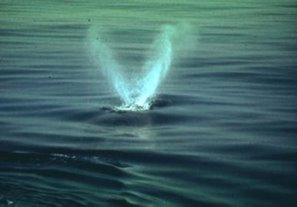
A few days ago I commented about passengers aboard the QM2 who had threatened a sit-in after a casualty in one of the ship's propulsion pods caused the owners to cancel three scheduled stops. The news reminded me of something that happened on my boat several years ago.
Back when I was running trips regularly I took a group of some forty people to see the puffins on Seal Island National Wildlife Refuge (NWR). This was a very common and routine trip for me, but on this particular day of flat seas and calm winds, I had the misfortune of suffering a similar casualty, though on a much smaller scale.
It happened when we got out to the island. In fact, the whole affair was kind of humorous.
On the way out a pin hole in my oil cooler created a vacuum that sucked the oil out of the transmission. Everything was fine while we were steaming along, because it was calm and the pressure plates in the transmission were already jammed together in forward gear. It was only when I slowed and then put the transmission in reverse that the problem became evident. (I have since added a transmission oil pressure gauge to prevent this sort of insidious casualty from recurring.)
The funny part was this: I had asked a friend to come as mate. He's a self-employed boat builder and all around nautical genius whom I thought needed a break and some fun in the sun. Besides, he'd never been out there, and had never seen a puffin. For the two hour trip to the island, he mostly kept me company in the wheelhouse, except for when he went on deck to schmooze with the customers or bathe in the early August sun.
At my destination, I would typically take the boat straight toward the rock ledges at the northwest corner of the island. It's deep there, it's where the nesting sites are, and I can bring the boat twenty feet from the birds. If I wanted or had to, I could lay the bow onto the smooth rock outcrop of the island without damage to either the boat or the outcrop. The geology of the place, and its seasonally protected location, afford me that luxury. In fact, I often played a little prank on the passengers standing on the foredeck by pretending to NOT be paying attention as we closed the distance to shore. Out of the corner of my eye I would see nervous heads on the bow turning around to make sure their captain hadn't had a heart attack or lost his mind. At the very last second, when collision seemed imminent, I would put the boat in reverse and stop all headway. We were never going very fast, and it wasn't like I was taking any risk (as you'll soon discover) but it was still fun.
Unfortunately, this time was a bit different. My nautical genius friend Bernie standing beside me, I headed in. We got closer and closer, heads turned, puffins flew here and there, and Bernie was saying, "Bob? Um, Bob? The island, Bob." I pretended to NOT pay attention, then close enough, collision pending, prank satisfied, I put the gear lever in reverse.
But there was no reverse. The boat continued forward.
Bernie said: "Bob?
And I said: "Huh, guess what Bernie? I have no reverse gear."
Bernie's first reaction was: "That's funny. Stop the boat."
"No, seriously, Bernie. I have no reverse. Go astern and get the engine box cover off and see if it's a linkage or cable problem." At which time Bernie disappeared aft in the blink of an eye.
I turned the helm hard to port and the combination of bare headway and a light easterly wind turned the bow. I felt the hull squeak over the ledge as we slowly turned and then inched toward open water. The passengers, of course, were stupified.
I let the boat drift into deeper water where I set the anchor. Problem identified, I called a friend for a tow. Here's where the story relates to the QM2:
On the way home, being towed in by my friend, I told the passengers there would be no charge for the trip and also that everyone who had already paid would get a full refund. Guess what? They were happy. They didn't want a refund. Passengers who hadn't yet paid tried to force cash into my hand. When I refused to take it, I discovered later they had secreted away the money in the folds of my 55 plus life jackets. For weeks afterwards, I was finding money tucked away on the boat. In the end, I had made my charter fee and more.
Talk about having a renewed faith in humanity.
-seabgb






